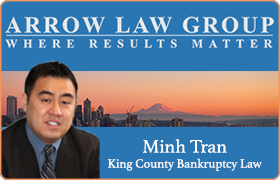Kirkland Bankruptcy Lawyer, Washington
Sponsored Law Firm
-
 x
x

Click For More Info:
-
Arrow Law Group, PLLC
1904 3rd Ave., Ste 930, Seattle, WA 98101 » view mapKing County Bankruptcy Lawyer Where Results Matter
Arrow Law Group works together to devote their practice to helping people resolve issues related to debts, personal injury, family law, criminal defense, and immigration.
800-821-3170  Minh T. Tran Seattle, WA
Minh T. Tran Seattle, WAAttorney At Law - WA, 2009
Michigan State, J.D.
 Contact UsEmail or Call 24/7
Contact UsEmail or Call 24/7Contact Arrow Law Group, PLLC today
Includes: Bankruptcy Litigation, Commercial Bankruptcy, Consumer Bankruptcy, Dissolution
Aaron Michael Streit
International Other, Immigration, Corporate, Commercial Bankruptcy
Status: In Good Standing Licensed: 15 Years
Adria Vondra
Tax, Estate Planning, Family Law, Divorce & Family Law, Bankruptcy
Status: In Good Standing Licensed: 16 Years
Alan Richard Torres
Land Use & Zoning, Estate Planning, Contract, Commercial Bankruptcy
Status: In Good Standing Licensed: 29 Years
Alan B. Mador
Landlord-Tenant, Litigation, Business & Trade, Commercial Bankruptcy
Status: Deceased Licensed: 39 Years
Alan Brown
Motor Vehicle, Immigration, Identity Theft, Bankruptcy
Status: In Good Standing Licensed: 27 Years
Alan Wood Spragins
Corporate, International Tax, Federal, Commercial Bankruptcy
Status: In Good Standing Licensed: 29 Years
Alex B Galloway
Commercial Bankruptcy, Commercial Real Estate, Real Estate
Status: Inactive Licensed: 72 Years
Alexandra T Mckay
Business & Trade, Commercial Bankruptcy, Intellectual Property, Electronic Commerce
Status: In Good Standing Licensed: 19 Years
Alice M. Garland
Commercial Bankruptcy, Commercial Real Estate, Real Estate
Status: Suspended Licensed: 51 Years


 Minh T. Tran Seattle, WA
Minh T. Tran Seattle, WA Contact UsEmail or Call 24/7
Contact UsEmail or Call 24/7
